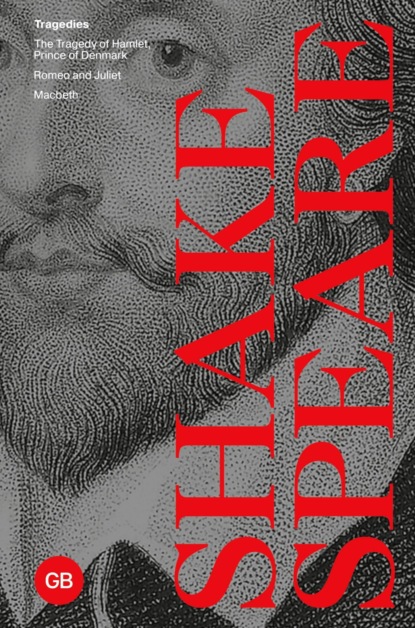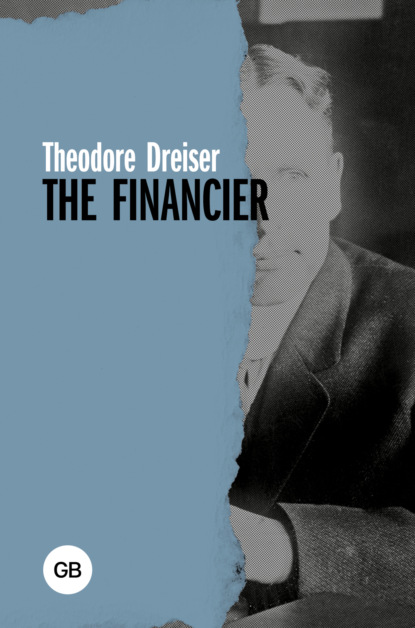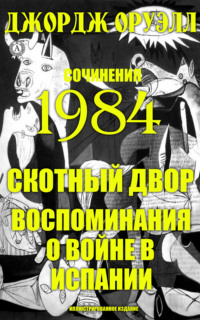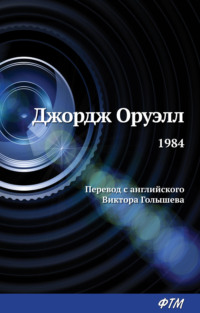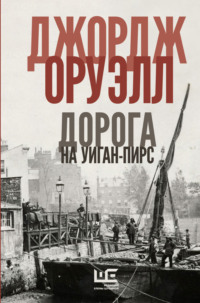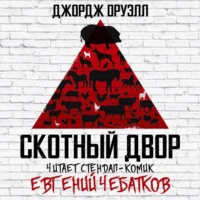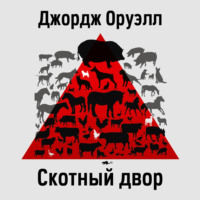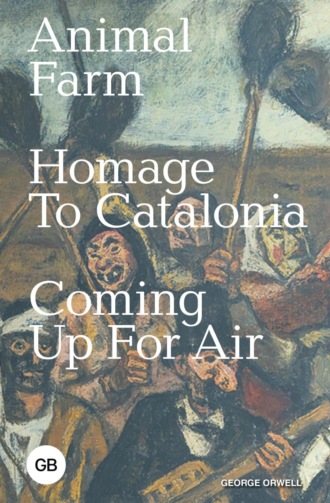
Полная версия
Animal Farm. Homage to Catalonia. Coming Up for Air / Скотный двор. Памяти Каталонии. Глотнуть воздуха
One day in February we saw a Fascist aeroplane approaching. As usual, a machine-gun was dragged into the open and its barrel cocked up, and everyone lay on his back to get a good aim. Our isolated positions were not worth bombing, and as a rule the few Fascist aeroplanes that passed our way circled round to avoid machine-gun fire. This time the aeroplane came straight over, too high up to be worth shooting at, and out of it came tumbling not bombs but white glittering things that turned over and over in the air. A few fluttered down into the position. They were copies of a Fascist newspaper, the Heraldo de Aragon, announcing the fall of Malaga.
That night the Fascists made a sort of abortive attack. I was just getting down into kip, half dead with sleep, when there was a heavy stream of bullets overhead and someone shouted into the dug-out: ‘They’re attacking!’ I grabbed my rifle and slithered up to my post, which was at the top of the position, beside the machine-gun. There was utter darkness and diabolical noise. The fire of, I think five machine-guns was pouring upon us, and there was a series of heavy crashes caused by the Fascists flinging bombs over their own parapet in the most idiotic manner. It was intensely dark. Down in the valley to the left of us I could see the greenish flash of rifles where a small party of Fascists, probably a patrol, were chipping in. The bullets were flying round us in the darkness, crack-zip-crack. A few shells came whistling over, but they fell nowhere near us and (as usual in this war) most of them failed to explode. I had a bad moment when yet another machine-gun opened fire from the hill-top in our rear-actually a gun that had been brought up to support us, but at the time it looked as though we were surrounded..Presently our own machine-gun jammed, as it always did jam with those vile cartridges, and the ramrod was lost in the impenetrable darkness. Apparently there was nothing that one could do except stand still and be shot at. The Spanish machine-gunners disdained to take cover, in fact exposed themselves deliberately, so I had to do likewise. Petty though it was, the whole experience was very interesting. It was the first time that I had been properly speaking under fire, and to my humiliation I found that I was horribly frightened. You always, I notice, feel the same when you are under heavy fire-not so much afraid of being hit as afraid because you don’t know where you will be hit. You are wondering all the while just where the bullet will nip you, and it gives your whole body a most unpleasant sensitiveness.
After an hour or two the firing slowed down and died away. Meanwhile we had had only one casualty. The Fascists had advanced a couple of machine-guns into no man’s land, but they had kept a safe distance and made no attempt to storm our parapet. They were in fact not attacking, merely wasting cartridges and making a cheerful noise to celebrate the fall of Malaga. The chief importance of the affair was that it taught me to read the war news in the papers with a more disbelieving eye. A day or two later the newspapers and the radio published reports of a tremendous attack with cavalry and tanks (up a perpendicular hill-side!) which had been beaten off by the heroic English.
When the Fascists told us that Malaga had fallen we set it down as a lie, but next day there were more convincing rumours, and it must have been a day or two later that it was admitted officially. By degrees the whole disgraceful story leaked out-how the town had been evacuated without firing a shot, and how the fury of the Italians had fallen not upon the troops, who were gone, but upon the wretched civilian population, some of whom were pursued and machine-gunned for a hundred miles. The news sent a sort of chill all along the line, for, whatever the truth may have been, every man in the militia believed that the loss of Malaga was due to treachery. It was the first talk I had heard of treachery or divided aims. It set up in my mind the first vague doubts about this war in which, hitherto, the rights and wrongs had seemed so beautifully simple.
In mid February we left Monte Oscuro and were sent, together with all the P.O.U.M. troops in this sector, to make a part of the army besieging Huesca. It was a fifty-mile lorry journey across the wintry plain, where the clipped vines were not yet budding and the blades of the winter barley were just poking through the lumpy soil. Four kilometres from our new trenches Huesca glittered small and clear like a city of dolls’ houses. Months earlier, when Sietamo was taken, the general commanding the Government troops had said gaily: ‘Tomorrow we’ll have coffee in Huesca.’ It turned out that he was mistaken. There had been bloody attacks, but the town did not fall, and ‘Tomorrow we’ll have coffee in Huesca’ had become a standing joke throughout the army. If I ever go back to Spain I shall make a point of having a cup of coffee in Huesca.
Chapter Five
ON the eastern side of Huesca, until late March, nothing happened-almost literally nothing. We were twelve hundred metres from the enemy. When the Fascists were driven back into Huesca the Republican Army troops who held this part of the line had not been over-zealous in their advance, so that the line formed a kind of pocket. Later it would have to be advanced-a ticklish job under fire-but for the present the enemy might as well have been nonexistent; our sole preoccupation was keeping warm and getting enough to eat. As a matter of fact there were things in this period that interested me greatly, and I will describe some of them later. But I shall be keeping nearer to the order of events if I try here to give some account of the internal political situation on the Government side.
At the beginning I had ignored the political side of the war, and it was only about this time that it began to force itself upon my attention. If you are not interested in the horrors of party politics, please skip; I am trying to keep the political parts of this narrative in separate chapters for precisely that purpose. But at the same time it would be quite impossible to write about the Spanish war from a purely military angle. It was above all things a political war. No event in it, at any rate during the first year, is intelligible unless one has some grasp of the inter-party struggle that was going on behind the Government lines.
When I came to Spain, and for some time afterwards, I was not only uninterested in the political situation but unaware of it. I knew there was a war on, but I had no notion what kind of a war. If you had asked me why I had joined the militia I should have answered: ‘To fight against Fascism,’ and if you had asked me what I was fighting for, I should have answered: ‘Common decency.’ I had accepted the News Chronicle-New Statesman version of the war as the defence of civilization against a maniacal outbreak by an army of Colonel Blimps in the pay of Hitler. The revolutionary atmosphere of Barcelona had attracted me deeply, but I had made no attempt to understand it. As for the kaleidoscope of political parties and trade unions, with their tiresome names-P.S.U.C., P.O.U.M., F.A.I., C.N.T., U.G.T., J.C.I., J.S.U., A.I.T.-they merely exasperated me. It looked at first sight as though Spain were suffering from a plague of initials. I knew that I was serving in something called the P.O.U.M. (I had only joined the P.O.U.M. militia rather than any other because I happened to arrive in Barcelona with I.L.P. papers), but I did not realize that there were serious differences between the political parties. At Monte Pocero, when they pointed to the position on our left and said:
‘Those are the Socialists’ (meaning the P.S.U.C.), I was puzzled and said: ‘Aren’t we all Socialists?’ I thought it idiotic that people fighting for their lives should have separate parties; my attitude always was, ‘Why can’t we drop all this political nonsense and get on with the war?’ This of course was the correct’ anti-Fascist’ attitude which had been carefully disseminated by the English newspapers, largely in order to prevent people from grasping the real nature of the struggle. But in Spain, especially in Catalonia, it was an attitude that no one could or did keep up indefinitely. Everyone, however unwillingly, took sides sooner or later. For even if one cared nothing for the political parties and their conflicting ‘lines’, it was too obvious that one’s own destiny was involved. As a militiaman one was a soldier against Franco, but one was also a pawn in an enormous struggle that was being fought out between two political theories. When I scrounged for firewood on the mountainside and wondered whether this was really a war or whether the News Chronicle had made it up, when I dodged the Communist machine-guns in the Barcelona riots, when I finally fled from Spain with the police one jump behind me-all these things happened to me in that particular way because I was serving in the P.O.U.M. militia and not in the P.S.U.C. So great is the difference between two sets of initials!
To understand the alignment on the Government side one has got to remember how the war started. When the fighting broke out on 18 July it is probable that every anti-Fascist in Europe felt a thrill of hope. For here at last, apparently, was democracy standing up to Fascism. For years past the so-called democratic countries had been surrendering to Fascism at every step. The Japanese had been allowed to do as they liked in Manchuria. Hitler had walked into power and proceeded to massacre political opponents of all shades. Mussolini had bombed the Abyssinians while fifty-three nations (I think it was fifty-three) made pious noises ‘off’. But when Franco tried to overthrow a mildly Left-wing Government the Spanish people, against all expectation, had risen against him. It seemed-possibly it was-the turning of the tide.
But there were several points that escaped general notice. To begin with, Franco was not strictly comparable with Hitler or Mussolini. His rising was a military mutiny backed up by the aristocracy and the Church, and in the main, especially at the beginning, it was an attempt not so much to impose Fascism as to restore feudalism. This meant that Franco had against him not only the working class but also various sections of the liberal bourgeoisie-the very people who are the supporters of Fascism when it appears in a more modern form. More important than this was the fact that the Spanish working class did not, as we might conceivably do in England, resist Franco in the name of ‘democracy’ and the status quo’, their resistance was accompanied by-one might almost say it consisted of-a definite revolutionary outbreak. Land was seized by the peasants; many factories and most of the transport were seized by the trade unions; churches were wrecked and the priests driven out or killed. The Daily Mail, amid the cheers of the Catholic clergy, was able to represent Franco as a patriot delivering his country from hordes of fiendish ‘Reds’.
For the first few months of the war Franco’s real opponent was not so much the Government as the trade unions. As soon as the rising broke out the organized town workers replied by calling a general strike and then by demanding-and, after a struggle, getting-arms from the public arsenals. If they had not acted spontaneously and more or less independently it is quite conceivable that Franco would never have been resisted. There can, of course, be no certainty about this, but there is at least reason for thinking it. The Government had made little or no attempt to forestall the rising, which had been foreseen for a long time past, and when the trouble started its attitude was weak and hesitant, so much so, indeed, that Spain had three premiers in a single day[1].1 Moreover, the one step that could save the immediate situation, the arming of the workers, was only taken unwillingly and in response to violent popular clamour. However, the arms were distributed, and in the big towns of eastern Spain the Fascists were defeated by a huge effort, mainly of the working class, aided by some of the armed forces (Assault Guards, etc.) who had remained loyal. It was the kind of effort that could probably only be made by people who were fighting with a revolutionary intention-i.e. believed that they were fighting for something better than the status quo. In the various centres of revolt it is thought that three thousand people died in the streets in a single day. Men and women armed only with sticks of dynamite rushed across the open squares and stormed stone buildings held by trained soldiers with machine-guns. Machine-gun nests that the Fascists had placed at strategic spots were smashed by rushing taxis at them at sixty miles an hour. Even if one had heard nothing of the seizure of the land by the peasants, the setting up of local Soviets, etc., it would be hard to believe that the Anarchists and Socialists who were the backbone of the resistance were doing this kind of thing for the preservation of capitalist democracy, which especially in the Anarchist view was no more than a centralized swindling machine.
Meanwhile the workers had weapons in their hands, and at this stage they refrained from giving them up. (Even a year later it was computed that the Anarcho-Syndicalists in Catalonia possessed 30,000 rifles.) The estates of the big pro-Fascist landlords were in many places seized by the peasants. Along with the collectivization of industry and transport there was an attempt to set up the rough beginnings of a workers’ government by means of local committees, workers’ patrols to replace the old pro-capitalist police forces, workers’ militias based on the trade unions, and so forth. Of course the process was not uniform, and it went further in Catalonia than elsewhere. There were areas where the institutions of local government remained almost untouched, and others where they existed side by side with revolutionary committees. In a few places independent Anarchist communes were set up, and some of them remained in being till about a year later, when they were forcibly suppressed by the Government. In Catalonia, for the first few months, most of the actual power was in the hands of the Anarcho-syndicalists, who controlled most of the key industries. The thing that had happened in Spain was, in fact, not merely a civil war, but the beginning of a revolution. It is this fact that the anti-Fascist press outside Spain has made it its special business to obscure. The issue has been narrowed down to ‘Fascism versus democracy’ and the revolutionary aspect concealed as much as possible. In England, where the Press is more centralized and the public more easily deceived than elsewhere, only two versions of the Spanish war have had any publicity to speak of: the Right-wing version of Christian patriots versus Bolsheviks dripping with blood, and the Left-wing version of gentlemanly republicans quelling a military revolt. The central issue has been successfully covered up.
There were several reasons for this. To begin with, appalling lies about atrocities were being circulated by the pro-Fascist press, and well-meaning propagandists undoubtedly thought that they were aiding the Spanish Government by denying that Spain had ‘gone Red’. But the main reason was this: that, except for the small revolutionary groups which exist in all countries, the whole world was determined, upon preventing revolution in Spain. In particular the Communist Party, with Soviet Russia behind it, had thrown its whole weight against the revolution. It was the Communist thesis that revolution at this stage would be fatal and that what was to be aimed at in Spain was not workers’ control, but bourgeois democracy. It hardly needs pointing out why ‘liberal’ capitalist opinion took the same line. Foreign capital was heavily invested in Spain. The Barcelona Traction Company, for instance, represented ten millions of British capital; and meanwhile the trade unions had seized all the transport in Catalonia. If the revolution went forward there would be no compensation, or very little; if the capitalist republic prevailed, foreign investments would be safe. And since the revolution had got to be crushed, it greatly simplified things to pretend that no revolution had happened. In this way the real significance of every event could be covered up; every shift of power from the trade unions to the central Government could be represented as a necessary step in military reorganization. The situation produced was curious in the extreme. Outside Spain few people grasped that there was a revolution; inside Spain nobody doubted it. Even the P.S.U.C. newspapers. Communist-controlled and more or less committed to an anti-revolutionary policy, talked about ‘our glorious revolution’. And meanwhile the Communist press in foreign countries was shouting that there was no sign of revolution anywhere; the seizure of factories, setting up of workers’ committees, etc., had not happened-or, alternatively, had happened, but ‘had no political significance’. According to the Daily Worker (6 August 1936) those who said that the Spanish people were fighting for social revolution, or for anything other than bourgeois democracy, were’ downright lying scoundrels’. On the other hand, Juan Lopez, a member of the Valencia Government, declared in February 1937 that ‘the Spanish people are shedding their blood, not for the democratic Republic and its paper Constitution, but for… a revolution’. So it would appear that the downright lying scoundrels included members of the Government for which we were bidden to fight. Some of the foreign anti-Fascist papers even descended to the pitiful lie of pretending that churches were only attacked when they were used as Fascist fortresses. Actually churches were pillaged everywhere and as a matter of course, because it was perfectly well understood that the Spanish Church was part of the capitalist racket. In six months in Spain I only saw two undamaged churches, and until about July 1937 no churches were allowed to reopen and hold services, except for one or two Protestant churches in Madrid.
But, after all, it was only the beginning of a revolution, not the complete thing. Even when the workers, certainly in Catalonia and possibly elsewhere, had the power to do so, they did not overthrow or completely replace the Government. Obviously they could not do so when Franco was hammering at the gate and sections of the middle class were on their side. The country was in a transitional state that was capable either of developing in the direction of Socialism or of reverting to an ordinary capitalist republic. The peasants had most of the land, and they were likely to keep it, unless Franco won; all large industries had been collectivized, but whether they remained collectivized, or whether capitalism was reintroduced, would depend finally upon which group gained control. At the beginning both the Central Government and the Generalite de Cataluna (the semi-autonomous Catalan Government) could definitely be said to represent the working class. The Government was headed by Caballero, a Left-wing Socialist, and contained ministers representing the U.G.T. (Socialist trade unions) and the C.N.T. (Syndicalist unions controlled by the Anarchists). The Catalan Generalite was for a while virtually superseded by an anti-Fascist Defence Committee2[2] consisting mainly of delegates from the trade unions. Later the Defence Committee was dissolved and the Generalite was reconstituted so as to represent the unions and the various Left-wing parties. But every subsequent reshuffling of the Government was a move towards the Right. First the P.O.U.M. was expelled from the Generalite; six months later Caballero was replaced by the Right-wing Socialist Negrin; shortly afterwards the C.N.T. was eliminated from the Government; then the U.G.T.; then the C.N.T. was turned out of the Generalite; finally, a year after the outbreak of war and revolution, there remained a Government composed entirely of Right-wing Socialists, Liberals, and Communists.
The general swing to the Right dates from about October-November 1936, when the U.S.S.R. began to supply arms to the Government and power began to pass from the Anarchists to the Communists. Except Russia and Mexico no country had had the decency to come to the rescue of the Government, and Mexico, for obvious reasons, could not supply arms in large quantities. Consequently the Russians were in a position to dictate terms. There is very little doubt that these terms were, in substance, ‘Prevent revolution or you get no weapons’, and that the first move against the revolutionary elements, the expulsion of the P.O.U.M. from the Catalan Generalite, was done under orders from the U.S.S.R. It has been denied that any direct pressure was exerted by the Russian Government, but the point is not of great importance, for the Communist parties of all countries can be taken as carrying out Russian policy, and it is not denied that the Communist Party was the chief mover first against the P.O.U.M., later against the Anarchists and against Caballero’s section of the Socialists, and, in general, against a revolutionary policy. Once the U.S.S.R. had intervened the triumph of the Communist Party was assured. To begin with, gratitude to Russia for the arms and the fact that the Communist Party, especially since the arrival of the International Brigades, looked capable of winning the war, immensely raised the Communist prestige. Secondly, the Russian arms were supplied via the Communist Party and the parties allied to them, who saw to it that as few as possible got to their political opponents[3]. Thirdly, by proclaiming a non-revolutionary policy the Communists were able to gather in all those whom the extremists had scared. It was easy, for instance, to rally the wealthier peasants against the collectivization policy of the Anarchists. There was an enormous growth in the membership of the party, and the influx was largely from the middle class-shopkeepers, officials, army officers, well-to-do peasants, etc., etc. The war was essentially a triangular struggle. The fight against Franco had to continue, but the simultaneous aim of the Government was to recover such power as remained in the hands of the trade unions. It was done by a series of small moves-a policy of pin-pricks, as somebody called it-and on the whole very cleverly. There was no general and obvious counter-revolutionary move, and until May 1937 it was scarcely necessary to use force. The workers could always be brought to heel by an argument that is almost too obvious to need stating: ‘Unless you do this, that, and the other we shall lose the war.’ In every case, needless to say, it appeared that the thing demanded by military necessity was the surrender of something that the workers had won for themselves in 1936. But the argument could hardly fail, because to lose the war was the last thing that the revolutionary parties wanted; if the war was lost democracy and revolution. Socialism and Anarchism, became meaningless words. The Anarchists, the only revolutionary party that was big enough to matter, were obliged to give way on point after point. The process of collectivization was checked, the local committees were got rid of, the workers patrols were abolished and the pre-war police forces, largely reinforced and very heavily armed, were restored, and various key industries which had been under the control of the trade unions were taken over by the Government (the seizure of the Barcelona Telephone Exchange, which led to the May fighting, was one incident in this process); finally, most important of all, the workers’ militias, based on the trade unions, were gradually broken up and redistributed among the new Popular Army, a ‘non-political’ army on semi-bourgeois lines, with a differential pay rate, a privileged officer-caste, etc., etc. In the special circumstances this was the really decisive step; it happened later in Catalonia than elsewhere because it was there that the revolutionary parties were strongest. Obviously the only guarantee that the workers could have of retaining their winnings was to keep some of the armed forces under their own control. As usual, the breaking-up of the militias was done in the name of military efficiency; and no one denied that a thorough military reorganization was needed. It would, however, have been quite possible to reorganize the militias and make them more efficient while keeping them under direct control of the trade unions; the main purpose of the change was to make sure that the Anarchists did not possess an army of their own. Moreover, the democratic spirit of the militias made them breeding-grounds for revolutionary ideas. The Communists were well aware of this, and inveighed ceaselessly and bitterly against the P.O.U.M. and Anarchist principle of equal pay for all ranks. A general ‘bourgeoisification’, a deliberate destruction of the equalitarian spirit of the first few months of the revolution, was taking place. All happened so swiftly that people making successive visits to Spain at intervals of a few months have declared that they seemed scarcely to be visiting the same country; what had seemed on the surface and for a brief instant to be a workers’ State was changing before one’s eyes into an ordinary bourgeois republic with the normal division into rich and poor. By the autumn of 1937 the ‘Socialist’ Negrin was declaring in public speeches that ‘we respect private property’, and members of the Cortes who at the beginning of the war had had to fly the country because of their suspected Fascist sympathies were returning to Spain. The whole process is easy to understand if one remembers that it proceeds from the temporary alliance that Fascism, in certain forms, forces upon the bourgeois and the worker. This alliance, known as the Popular Front, is in essential an alliance of enemies, and it seems probable that it must always end by one partner swallowing the other. The only unexpected feature in the Spanish situation-and outside Spain it has caused an immense amount of misunderstanding-is that among the parties on the Government side the Communists stood not upon the extreme Left, but upon the extreme Right. In reality this should cause no surprise, because the tactics of the Communist Party elsewhere, especially in France, have made it clear that Official Communism must be regarded, at any rate for the time being, as an anti-revolutionary force. The whole of Comintern policy is now subordinated (excusably, considering the world situation) to the defence of U.S.S.R., which depends upon a system of military alliances. In particular, the U.S.S.R. is in alliance with France, a capitalist-imperialist country. The alliance is of little use to Russia unless French capitalism is strong, therefore Communist policy in France has got to be anti-revolutionary. This means not only that French Communists now march behind the tricolour and sing the Marseillaise, but, what is more important, that they have had to drop all effective agitation in the French colonies. It is less than three years since Thorez, the Secretary of the French Communist Party, was declaring that the French workers would never be bamboozled into fighting against their German comrades [4]



